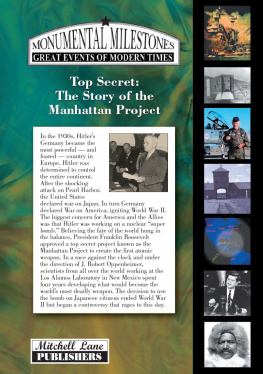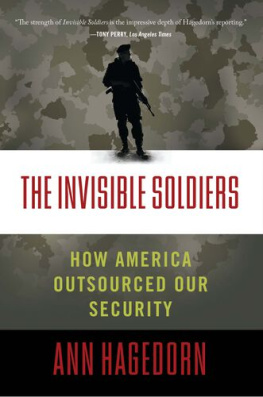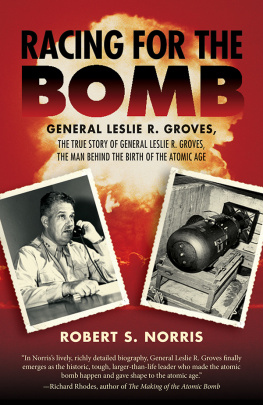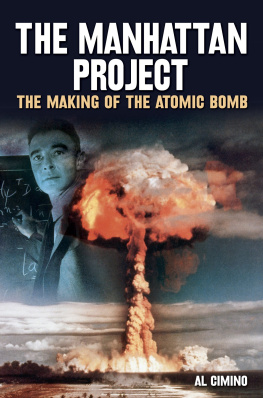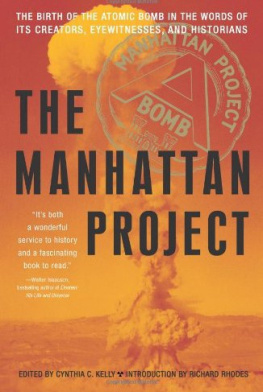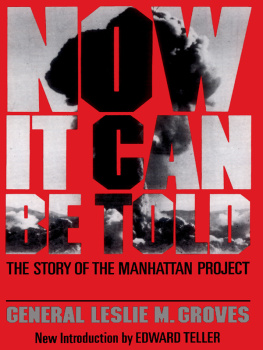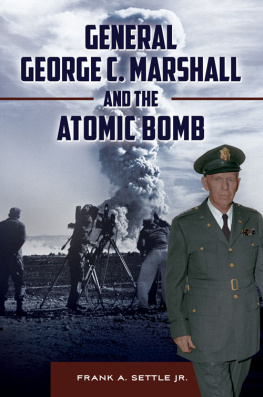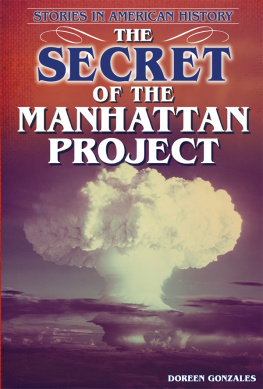One of our most thoughtful and perceptive political scientists has here explored a pivotal question of modern American governance: How can we trust or control experts when we have no idea what theyre talking about?... Written with the pace and accessibility of a cant put it down novel, The Prometheus Bomb forces us to think and rethink how to maintain a representative democracy in the modern world.
Dan H. Fenn, founding director of the John F. Kennedy Presidential Library who also served on the White House staff in the Kennedy administration
An absorbing account of perhaps the most consequential, yet casually made, policy decisions in American history. Beautifully written, the book conveys the high drama, stumbling pace, and terrible, unethical risks behind the development of the atom bomb.
E. S. Savas, professor of public affairs at Baruch College and former assistant secretary for policy development and research in the U.S. Department of Housing and Urban Development for President Ronald Reagan
The Prometheus Bomb
The Manhattan Project and Government in the Dark
Neil J. Sullivan
Potomac Books
An imprint of the University of Nebraska Press
2016 by Neil J. Sullivan
Cover designed by University of Nebraska Press
Author photo Joyce Murray Sullivan
All illustrations are from Wikimedia Commons.
All rights reserved. Potomac Books is an imprint of the University of Nebraska Press.
Library of Congress Cataloging-in-Publication Data
Names: Sullivan, Neil J., 1948 author.
Title: The Prometheus bomb: the Manhattan Project and government in the dark / Neil J. Sullivan.
Description: Lincoln: Potomac Books, An imprint of the University of Nebraska Press, 2016. | Includes bibliographical references and index.
Identifiers: LCCN 2016020649
ISBN 9781612348155 (cloth: alkaline paper)
ISBN 9781612348902 (epub)
ISBN 9781612348919 (mobi)
ISBN 9781612348926 (pdf)
Subjects: LCSH : Manhattan Project (U.S.)History. | Atomic bombUnited StatesHistory. | Atomic bombGovernment policyUnited StatesHistory. | United StatesMilitary policy. | Science and stateUnited States. | BISAC : HISTORY / Military / World War II. | HISTORY / United States / 20th Century.
Classification: LCC QC 773.3. U 5 S 86 2016 | DDC 355.8/25119097309044dc23
LC record available at https://lccn.loc.gov/2016020649
The publisher does not have any control over and does not assume any responsibility for author or third-party websites or their content.
For Joyce, Kate, Tim and Olivia, and Mo
Contents
Understanding government power has been a lifetime interest. How do communities organize themselves so that they can solve problems and promote common interests? How do we balance the interests of the community and the individual? What processes do we use to make decisions so that we can act efficiently while also giving proper consideration to people who may not have the wherewithal to participate in civic life? I am grateful to all the people who have helped me appreciate the complexity of those questions, beginning with my parents, who kept the spirit of Franklin Roosevelt alive in our home.
At Baruch CollegeCity University of New York, Diane Gibson, Rita Ormsby, Steve Savas, and Jerry Mitchell are friends and colleagues who set the standard for teaching, scholarship, and service. Thousands of students over thirty-eight years have inspired my curiosity and reflection about public affairs. Students and faculty are served by a staff that is a privilege to know.
Jane Dystel and Miriam Goderich are my friends and agents who took an inchoate sentiment and helped me turn it into an idea. Their contribution to seeing the essential political issues in the curious world of the atom was especially welcome.
Other companions have been enormously helpful through their thoughts about government, science, writing, and other subjects germane to this book. Jean Huff is a fellow writer and attorney who has been encouraging through her own example. Kenny Greehan serves the City of Yonkers with distinction and has had intriguing observations about the wonderful city where my family and I live. Joe Cianciulli is our chairman of the Yonkers Zoning Board of Appeals, a post from which he has paid particular attention to the interests of the people who so often are ignored in their struggles. After ten years on the zoning board, my education continues on the Westchester County Planning Board, and I am grateful to my colleagues there. Pete Bradley is a friend and neighbor who has helped me keep focused while navigating the book.
James Jond is my friend and teacher who is not responsible for my failure to master his lessons on the golf swing. Deborah Roche has given me some clarity about why I struggle with Jamess wisdom, and, whatever happens with par, her friendship is a great gift.
Peter Woll, my Brandeis mentor, remains my dear friend whose counsel has been invaluable. Walter Modrys, SJ , has read the early chapters and has provided particularly insightful comments. Peter Michaels has let me interrupt numerous rounds of golf, to answer questions about science that many people learned by the fourth grade. Dave Lockhart has been very gracious in discussing the book, another friendship with grand lunches in Hyde Park. Vic Quiroz has helped me keep the book in perspective with other priorities so that it becomes another form of teaching and service. Dan OConnor, MD , distinguished himself in both elements of C. P. Snows Two Cultures, and hes missed by all who loved and admired him.
Kristen Rowley at the University of Nebraska Press was an early champion of the book. Tom Swanson and Emily Wendell are the editors who have guided the manuscript through the publication process. Jeremy Hall has provided the haircut the manuscript needed, through superb copyediting.
The Prometheus Bomb is a book about World War II, and that conflict is as close as some of the people dearest to me. Dan Fenn left Harvard for the Army Air Corps in 1943 to serve in the European theater. He returned to Cambridge, was appointed to the White House staff by President John F. Kennedy, became the founding director of the Kennedy Presidential Library, and continues teaching at Harvard and elsewhere, still the youngest person in whatever room hes in.
Tim Ireland served our country through the long, twilight struggle of the Cold War and the current challenges. He and his sister Kathleen have been treasured friends since our college days. Their father, Dr. Robert Ireland, served in the Pacific during World War II as a surgeon before returning home to marry the wonderful Joan and to extend kindness to those who knew him.
Colin Cooke was a friend, writer, and neighbor who sang as the sole chorister at the coronation of King George VI, served as an engine machanic in the RAF during the war, and whose first born, another Colin, can boast of being the founder of our neighborhoods Sunday Cigar Seminar.
Al Nocella is the son of Staff Sergeant Nocella, another Al, who was drafted in 1940 with the expectation that he would be serving until 1942. Pearl Harbor extended his service for the duration, and he was sent to Europe in March of 1945. He returned to America after the war, married the marvelous Eleanor, and raised three splendid children.
Ron Yoshida has been a friend since our days at Loyola High School in Los Angeles, where we took classes from Mr. Bill Lenihan that put the questions about government, history, and writing in a permanent place in our lives. Ron serves the country by helping people in the Middle East work on education reform. His parents, Robert and Yoshiye Yoshida, both born in the United States, were sent to internment camps during World War II because of the country where their forebears were born, a distinctly un-American act. They returned from the camps to raise a wonderful family and contribute to their friends and neighbors.


